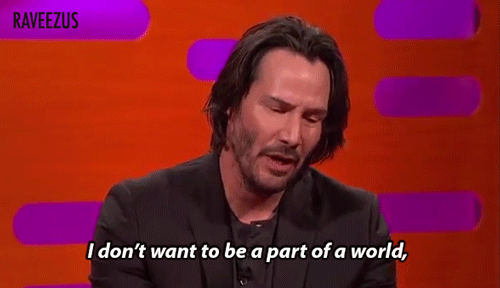Text
1 note
·
View note
Text
The Tiger and the Goat by Joseph Campbell
CAMPBELL: The story I’d like to give is that of a tigress who was pregnant, and starving hungry. She came upon a little flock of goats. And in pouncing upon them, with the energy that she expended, she brought on the birth of her little one and her own death.
So she died giving birth to a little tiger. The goats, meanwhile, had scattered, and they finally came back to their little grazing place, and they found this just-born little tiger and its dead mother.
They had very strong parental instincts, and they adopted the little tiger, who grew up thinking he was a goat. He learned to bleat, he learned to eat grass, but the grass was very bad for his digestive system. He couldn’t handle the cellulose. By the time he was an adolescent he was a pretty miserable specimen of his species. At that time a male tiger pounced on the little flock, and they again scattered.
But this little fellow was a tiger, he wasn’t a goat. So there he was, standing. The big fellow looked at him. And he said, “What, you living here with these goats?” The little tiger goes Maaaaaa and begins nibbling grass in a kind of embarrassed way.
The big fellow is mortified, like a father coming home and finding his son with long hair; something like that. So he swats him back and forth a couple of times because the little fellow could only bleat and nibble grass.
Then he takes him by the neck and carries him to a pond. There was no wind blowing; it was perfectly still. Now the Hindus say of yoga that yoga is the art of making the mind stand still. The intentional stopping of the spontaneous activity of the mind itself. It’s as though a pond was to be made to stand still.
When the wind is blowing, the waters are rippling and all these little broken reflections come and go, come and go, come and go, and that’s the way we are in our lives.
We identify ourselves with one of these coming and going reflections, and we think, Oh dear, here I come, there I go. If you make the pond stand still, then the image stands still and you see your eternal presence, and identifying with that, you’re relatively indifferent to the world.
So this little tiger is now being introduced to the principles of yoga. And the big fellow says, “Now look into that pond.” And the little one puts his face over it. And for the first time in his little life he sees his actual face.
The big tiger puts his face over there, and he says, “You see? You’ve got the face of a tiger, you’re like me. Be like me! ” (Now that’s guru stuff. I’ll give you my picture to wear and you’ll know who you are.) Anyhow, the little tiger’s beginning to sort of get the message.
The big fellow’s next discipline is to pick him up and take him to his den, where there are the remains of a recently slaughtered gazelle. The big fellow takes a chunk of this bloody stuff, and he says to the little one, “Open your face.”
The little one backs off. He says, “I’m a vegetarian.” “Well,” says the big one, “none of that nonsense.” And he shoves it down his throat. And the little one gags on it, as the text says, “as all do on true doctrine.”
So, gagging on the true doctrine, it’s nevertheless getting into his system since it is his proper food, and it activates his proper nervous system. Spontaneously moved by his proper food, he gives a little tiger roar, sort of Tiger Roar 101. Then the big guy says, “There we are. Now we’ve got it. Now we’ll eat tiger food.”
There’s a moral here, of course. It is that we’re all really tigers living here as goats. The function of sociology and most of our religious education is to teach us to be goats.
But the function of the proper interpretation of mythological symbols and meditation discipline is to introduce you to your tiger face. Then comes the problem.
You’ve found your tiger face but you’re still living here with these goats. How are you going to do that? What you will have learned is through all the forms of the world, the one radiance of eternity shows itself.
You can regard the appearance of the miracle of life in all these forms. But don’t let them know that you are a tiger! When al-Hallaj or Jesus let the orthodox community know that they were tigers, they were crucified.
And so the Sufis learned the lesson at that time with the death of al-Hallaj, around A.D. 900.
And it is: You wear the outer garment of the law; you behave like everyone else. And you wear the inner garment of the mystic way. Now that’s the great secret of life. So with that I commit you all to be tigers in the world. But don’t let anybody know it!
—The Hero’s Journey: Joseph Campbell on His Life and Work
16 notes
·
View notes
Photo

Because of the Fifth Amendment, no one in the U.S. may legally be forced to testify against himself, and because of the Fourth Amendment, no one’s records or belongings may legally be searched or seized without just cause. However, American police are trained to use methods of deception, intimidation and manipulation to circumvent these restrictions. In other words, cops routinely break the law—in letter and in spirit—in the name of enforcing the law. Several examples of this are widely known, if not widely understood.
1) “Do you know why I stopped you?”
Cops ask this, not because they want to have a friendly chat, but because they want you to incriminate yourself. They are hoping you will “voluntarily” confess to having broken the law, whether it was something they had already noticed or not. You may think you are apologizing, or explaining, or even making excuses, but from the cop’s perspective, you are confessing. He is not there to serve you; he is there fishing for an excuse to fine or arrest you. In asking you the familiar question, he is essentially asking you what crime you just committed. And he will do this without giving you any “Miranda” warning, in an effort to trick you into testifying against yourself.
2) “Do you have something to hide?”
Police often talk as if you need a good reason for not answering whatever questions they ask, or for not consenting to a warrantless search of your person, your car, or even your home. The ridiculous implication is that if you haven’t committed a crime, you should be happy to be subjected to random interrogations and searches. This turns the concept of due process on its head, as the cop tries to put the burden on you to prove your innocence, while implying that your failure to “cooperate” with random harassment must be evidence of guilt.
3) “Cooperating will make things easier on you.”
The logical converse of this statement implies that refusing to answer questions and refusing to consent to a search will make things more difficult for you. In other words, you will be punished if you exercise your rights. Of course, if they coerce you into giving them a reason to fine or arrest you, they will claim that you “voluntarily” answered questions and “consented” to a search, and will pretend there was no veiled threat of what they might do to you if you did not willingly “cooperate.”
(Such tactics are also used by prosecutors and judges via the procedure of “plea-bargaining,” whereby someone accused of a crime is essentially told that if he confesses guilt—thus relieving the government of having to present evidence or prove anything—then his suffering will be reduced. In fact, “plea bargaining” is illegal in many countries precisely because it basically constitutes coerced confessions.)
4) “We’ll just get a warrant.”
Cops may try to persuade you to “consent” to a search by claiming that they could easily just go get a warrant if you don’t consent. This is just another ploy to intimidate people into surrendering their rights, with the implication again being that whoever inconveniences the police by requiring them to go through the process of getting a warrant will receive worse treatment than one who “cooperates.” But by definition, one who is threatened or intimidated into “consenting” has not truly consented to anything.
5.) We have someone who will testify against you
Police “informants” are often individuals whose own legal troubles have put them in a position where they can be used by the police to circumvent and undermine the constitutional rights of others. For example, once the police have something to hold over one individual, they can then bully that individual into giving false, anonymous testimony which can be used to obtain search warrants to use against others. Even if the informant gets caught lying, the police can say they didn’t know, making this tactic cowardly and illegal, but also very effective at getting around constitutional restrictions.
6) “We can hold you for 72 hours without charging you.”
Based only on claimed suspicion, even without enough evidence or other probable cause to charge you with a crime, the police can kidnap you—or threaten to kidnap you—and use that to persuade you to confess to some relatively minor offense. Using this tactic, which borders on being torture, police can obtain confessions they know to be false, from people whose only concern, then and there, is to be released.
7) “I’m going to search you for my own safety.”
Using so-called “Terry frisks” (named after the Supreme Court case of Terry v. Ohio, 392 U.S. 1), police can carry out certain limited searches, without any warrant or probable cause to believe that a crime has been committed, under the guise of checking for weapons. By simply asserting that someone might have a weapon, police can disregard and circumvent the Fourth Amendment prohibition on unreasonable searches.
U.S. courts have gone back and forth in deciding how often, and in what circumstances, tactics like those mentioned above are acceptable. And of course, police continually go far beyond anything the courts have declared to be “legal” anyway. But aside from nitpicking legal technicalities, both coerced confessions and unreasonable searches are still unconstitutional, and therefore “illegal,” regardless of the rationale or excuses used to try to justify them. Yet, all too often, cops show that to them, the Fourth and Fifth Amendments—and any other restrictions on their power—are simply technical inconveniences for them to try to get around. In other words, they will break the law whenever they can get away with it if it serves their own agenda and power, and they will ironically insist that they need to do that in order to catch “law-breakers” (the kind who don’t wear badges).
Of course, if the above tactics fail, police can simply bully people into confessing—falsely or truthfully—and/or carry out unconstitutional searches, knowing that the likelihood of cops having to face any punishment for doing so is extremely low. Usually all that happens, even when a search was unquestionably and obviously illegal, or when a confession was clearly coerced, is that any evidence obtained from the illegal search or forced confession is excluded from being allowed at trial. Of course, if there is no trial—either because the person plea-bargains or because there was no evidence and no crime—the “exclusionary rule” creates no deterrent at all. The police can, and do, routinely break the law and violate individual rights, knowing that there will be no adverse repercussions for them having done so.
Likewise, the police can lie under oath, plant evidence, falsely charge people with “resisting arrest” or “assaulting an officer,” and commit other blatantly illegal acts, knowing full well that their fellow gang members—officers, prosecutors and judges—will almost never hold them accountable for their crimes. Even much of the general public still presumes innocence when it comes to cops accused of wrong-doing, while presuming guilt when the cops accuse someone else of wrong-doing. But this is gradually changing, as the amount of video evidence showing the true nature of the “Street Gang in Blue” becomes too much even for many police-apologists to ignore.
http://www.alternet.org/civil-liberties/7-ways-police-will-break-law-threaten-or-lie-you-get-what-they-want
295K notes
·
View notes
Text
It is what it be
If President Whoever says 2+2=5 and Dr., Prof., and Pastor So and So tell you that 2+2=5. Then mom and dad tell you the same thing. When or if somebody ever cares enough to scientifically prove to you that 2+2 actually equals 4 will you be open minded and logical enough in your thinking to accept that what you were taught was wrong?
TruthBeTold
1 note
·
View note
Text
Reblog or your mom will die in 928 seconds.
I love my mom.

I am risking nothing

I AM SORRY FOLLOWERS, I LOVE MY MOMMY
Will not risk.

sorry followers :(
5M notes
·
View notes
Text
Reblog or your mom will die in 928 seconds.
I love my mom.

I am risking nothing

I AM SORRY FOLLOWERS, I LOVE MY MOMMY
Will not risk.

sorry followers :(
5M notes
·
View notes
Text
714
Tweaker Roll Call. Just reblog with area code if you’re a tweaker. Let’s see which state gets the highest number of tweakers
310
9K notes
·
View notes
Text
Reblog if it's okay to befriend you, ask questions, ask for advice, rant, vent, let something off your chest, or just have a nice chat.
💜 because new friends are sometimes all I need.
2K notes
·
View notes
Text
“Sometimes I wish I wasn’t as intelligent as I am. Because I can’t live in blissful ignorance like others. I can’t ignore the problems around me. I can’t live in peace knowing the type of world we live in. And the type of people that surround us. I can’t. I just can’t.”
— (via flakkiiz)
930 notes
·
View notes
Text
Modern Slavery!
Born like this!
Go to school or your parents go to jail.
Here's what the definition of good kid is.
Be a good kid.
Get good grades in the tests I designed for you.
Graduate school.
Go to college.
Do the same thing but pay more.
Now you owe money.
Get a job to repay that money.
Live your future for your past.
Done repaying? Now earn money.
Now spend your money on these things.
News: these guys are bad. Hate them. And let's bomb them.
News: these guys are good. Love us.
News: we're the good guys. Join us.
Get married or don't. Have kids.
Raise them like this.
Try working for our companies more to raise them the way we told you.
Die like this.
-----------------------
Modern slavery is all about definition of things.
You're a modern slave if you have to do what you don't want to do.
You're a modern slave if you're thinking about paying for something tomorrow that you bought yesterday.
You're a modern slave if you work for a company that you don't have a say in it's core definition.
You're a modern slave if you try and try and try to work harder to get a promotion.
It's a free country! Be a good boy/girl and use these apps and these new phones I made you and these new stuff we built just for you. Pay up!
40 notes
·
View notes






